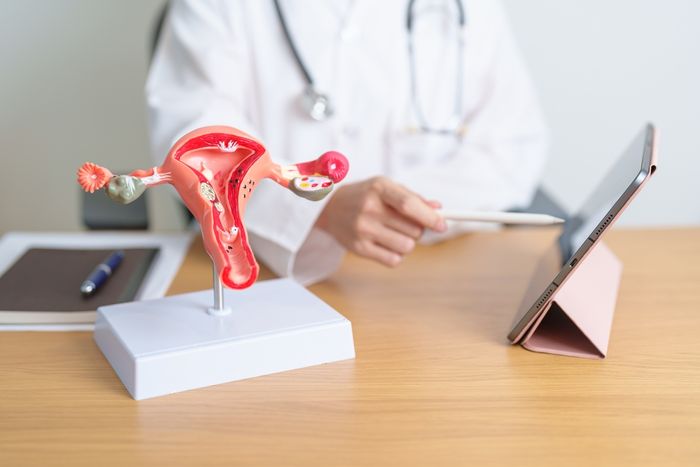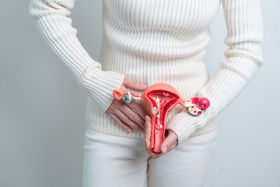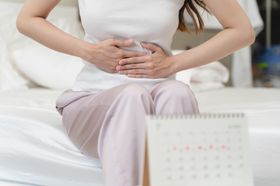Uterine Fibroids & Fertility: Important Facts & Conception Tips
Updated July 27, 2023.

Uterine fibroids can occur in any woman of childbearing age, predominantly those aged 30-40. The root cause is unconfirmed, but most experts think that it's due to hormones or even genetics. Studies show this condition seems more prevalent in African-American women than in other women. These non-cancerous growths develop in the uterus and are sometimes called leiomyomas or myomas. They vary in size, from as small as a pea to masses larger than a golf ball.
Michelle Tillman, a fertility educator and the founder of Fertility Freak, provides an in-depth understanding of uterine fibroids. She explores everything from detection and holistic treatments to removal surgery concerns, emphasizing the importance of fibroid education among women.
Symptoms of Uterine Fibroids
You could experience no symptoms. But more than likely, if you don't have symptoms, you may not even know that you have fibroids if they're present.
Symptoms when dealing with fibroids are:
- Heavy prolonged periods
- Pain or pressure in your pelvis
- Frequent use of the bathroom
- Reproductive issues that may interfere with your ability to get or stay pregnant
- Painful intercourse
- Constipation
- Bloating
» Struggling with a heavy flow? Check out this guide to better understand your bleeding patterns
How Fibroids Are Detected
During an OBGYN checkup, pap smears are usual but voluntary ultrasounds for fibroid detection aren't. Depending on their location, doctors could possibly detect fibroids through physical examination. "Sometimes the fibroids can be so large that your belly protrudes and you look like you're pregnant," says Tillman.
Young women should understand their bodies early. Heavy periods, for example, might be a sign of an underlying condition but often get treated with birth control, despite the cause.
Advocating for further examination is crucial, particularly if there's a family history of fibroids.
How Do Fibroids Affect Fertility?
The main question you may have is, "Can you get pregnant with uterine fibroids?" You absolutely can get pregnant. "A lot of clients that I see and work with are actually able to get pregnant even with their fibroids," says Tillman.
Can fibroids cause infertility?
Which fibroids cause infertility depends on their location, how many you have, their size, and whether it can cause complications were you to try and get pregnant.
Can fibroids outside the uterus cause infertility?
If the fibroids are attached closer to your fallopian tubes and block where the egg would be released, that can prevent the egg from reaching the lining of the womb. Here, your doctor may recommend working on shrinking the fibroids before trying to conceive again.
How Fibroids Affect Pregnancy
Fibroids act like a baby—they suck up all the nutrients. But when pregnant, your baby is also trying to get nutrients. People often miss their deficiencies. They might be low on iron or vitamin D or have a lot of inflammation, making it harder for nutrients to absorb. In these cases, you need higher micronutrient levels to have a safe pregnancy.
Do Fibroids Grow During Pregnancy?
Fibroids can change and grow during pregnancy. "I always recommend a preparatory period of about 90 days before you get pregnant if you know you have fibroids," says Tillman. Your eggs change based on what you're doing in your life—whether it's on purpose or not. The effects of these changes will only show after those 90 days.
Why do fibroids cause miscarriages?
If it's on the placenta where your baby needs to feed, then the fibroids will be consuming extra nutrients, disrupting your baby's healthy development.
Do fibroids shrink after pregnancy?
Research shows that fibroids can reduce in size significantly post-partum, and 37.2% of fibroids may no longer be present.
» Find out how charting your cycle can help you identify early pregnancy concerns
4 Treatment Options
There are holistic ways that Tillman recommends as a first resort. So what happens if fibroids are not removed versus if you have removal surgery? Let's explore some treatments:
1. Diet
Often, the importance of a nutrient-dense diet for overall health is overlooked at a younger age. Later on, when considering pregnancy, connections between health and lifestyle become clear, emphasizing the significance of preventive measures.
You might only have a certain amount of eggs when you're born, but the quality of those eggs can change with lifestyle changes. Fibroids may worsen in women in their 20s due to lifestyle choices like late nights, unhealthy diets, and convenience eating.
Some ways to improve your lifestyle include:
- Reduce sugar
- Eat nutrient-dense foods
- Limit caffeine intake
- Get more sleep
"A lot of people are drinking caffeine because they don't get enough sleep. So, if you get more sleep, you can reduce your caffeine," explains Tillman.
2. Supplements
You can help reduce fibroid-caused inflammation through supplements, like magnesium, but you have to ensure you take it daily. So many people who have infertility issues deal with magnesium deficiency.
There are lotions, pills, and other ways that you can get magnesium in your body. Even if you're not trying to get pregnant, magnesium can help eliminate PMS, cramping, and headaches.
3. Vaginal Steaming
Some people may be hesitant about vaginal steaming, but it is one of the most natural things you can do. Even if you don't have any special herbs that you add, just the steam in your body can make a huge difference with inflammation.
Steaming—even without herbs—with diet and lifestyle changes can reduce fibroids if you're consistent for at least 90 days.
There are no specific herbs that are recommended, but if you're adding any, here are some to try:
- Peppermint oil
- Oregano
- Vitex, which is supposed to help with infertility
Tip: Ensure you're not doing vaginal steaming when trying to get pregnant or during ovulation. Only do it before, during the follicular phase.
4. Removal Surgery
But surgery can have benefits, depending on where your fibroids are:
- Shorter timeframe before your body is in a pregnancy-ready state
- Can help with getting pregnant if the fibroid is blocking one of your tubes
For example, if you have a softball-sized fibroid and do natural remedies for 90 days, that's going to take longer to shrink than something that's golf ball-sized or pea-sized. You can then work on your inflammation after the surgery.
Make sure to ask your doctor the following before opting for surgery:
- Will this interfere with my ability to get pregnant?
- Can I still have a safe pregnancy after fibroid removal?
- What is the success rate after surgery?
- How long does it usually take to get pregnant afterward?
- Have you seen any complications?
Does fibroid removal affect hormones?
Research shows that the follicle-stimulating hormone and the luteinizing hormone levels may increase, which can impact ovulation. It's best to talk to your doctor about this.
Tips on Getting Pregnant With Fibroids
"With the whole 90-day rule, you need to start making holistic changes now so that your body can be in an optimal condition to get pregnant," says Tillman. "Make sure you know what you're working with too."
Here are tips for preconception to help improve your chances of pregnancy:
- Have an initial exam with your doctor to find the location and size of your fibroids.
- Seek holistic help from someone who can guide you through the necessary lifestyle changes.
- Implement holistic changes.
- Stay consistent for 90 days.
- Have a follow-up exam to see if there are any improvements.
- Evaluate the effectiveness of the holistic changes.
- Ask your doctor if surgery is necessary or if you can wait to see further results.
- Ensure your mindset is right—seek counseling, spiritual, or religious guidance.
"Your mindset affects your body as well. And once you do the steps to right it, you can be prepared to get pregnant even if your fibroids are not totally gone," Tillman explains.
Fill the Knowledge Gap and Track Your Fertility Cycle
Quality of life should not be neglected until a woman decides to have a child. Painful periods are often dismissed as "normal," but they could be indicative of deeper health issues, like fibroids. The sooner symptoms are addressed, the better they can be managed or resolved without invasive treatments like surgery.
More education is needed to inform young women about what is normal and what isn't in terms of their health. And one way of broadening education is through fertility trackers like Tempdrop's. It allows you to understand your cycle, identify your fertility window, and live harmoniously with your body's natural rhythms.





